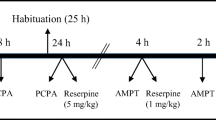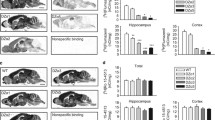Abstract
The effects of non-competitive (MK-801, phencyclidine, and ketamine) and competitive (CGP 39551, CGS 19755, and NPC 12626) N-methyl-d-aspartate (NMDA) receptor antagonists on locomotor activity in inbred CBA and C57, and in outbred NMRI mice were examined. Administration of the non-competitive NMDA antagonists produced a dose-dependent increase in well-coordinated locomotor activity at lower doses, followed by a bizarre behavioral syndrome (head weaving, body rolling, rotations, ataxia) after higher doses. The pharmacological profile of the competitive antagonists CGP 39551, CGS 19755, and NPC 12626 was more complex. CGP 39551 dose-dependently inhibited locomotor activity, whereas CGS 19755 and NPC 12626 displayed a biphasic action, that is low doses inhibited locomotor activity, whereas higher doses produced mild behavioral stimulation. The behavioral effects of NMDA antagonists appear to be genetically determined, since CBA animals were most sensitive to both noncompetitive and competitive antagonists, followed by NMRI and C57 animals. The differential effects of NMDA antagonists in various strains of mice suggest that the observed behavioral differences may be due to genetic differences in the NMDA/glutamate receptor channel complex.
Similar content being viewed by others
References
Bennett DA, Bernards PS, Amrick CL (1988) A comparison of PCP-like compounds for NMDA antagonism in two in vivo models. Life Sci 42:447–454
Bennett DA, Bernard PS, Amrick CL, Wilson DE, Liebman JM, Hutchinson AJ (1989) Behavioral pharmacological profile of CGS 19755, a competitive antagonist at N-methyl-d-aspartate receptors. J Pharmacol Exp Ther 250:454–460
Clineschmidt BV, Martin GE, Bunting PR (1982a) Anticonvulsant activity of (+)-5-methyl-10,11-dihydro-5-H-dibenzo[a,d]cyclohepten-5,10-imine (MK-801), a substance with potent anticonvulsant, central sympathomimetic and apparent anxiolytic properties. Drug Dev Res 2:123–134
Clineschmidt BV, Martin GE, Bunting PR, Papp NL (1982b) Central sympathomimetic activity of (+)-5-methyl-10,11-dihydro-5-H-dibenzo-[a,d]cyclohepten-5,10-imine (MK-801), a substance with potent anticonvulsant, central sympathomimetic and apparent anxiolytic properties. Drug Dev Res 2:135–146
Clineschmidt BV, Williams M, Witoslawski MJJ, Bunting PR, Risley EA, Totaro JA (1982c) Restoration of shock-suppressed behavior by treatment with (+)-5-methyl-10,11-dihydro-5-H-dibenzo[a,d]cyclohepten-5,10-imine (MK-801), a substance with potent anticonvulsant, central sympathomimetic and apparent anxiolytic properties. Drug Dev Res 2:147–163
Croucher MJ, Collins JF, Meldrum BS (1982) Anticonvulsant action of excitatory amino acid antagonists. Science 216:899–901
Fagg GE, Pozza MF, Brugger F, Olpe H-R, Schmutz M, Van Riezen H, Heckendorn R, Allgeier H (1990) CGP 37849 & CGP 39551: novel competitive NMDA receptor antagonists with potent oral anticonvulsant activity. Neurochem Int 16[Suppl 1]:17
Ferkany JW, Kyle DJ, Willets J, Rzeszotarski WJ, Guzewska ME, Ellenberger SR, Jones SM, Sacaan AI, Snell LD, Borosky S, Jones BE, Johnson KM, Balster RL, Burchett K, Kawasaki K, Hoch DB, Dingledine R (1989) Pharmacological profile of NPC 12626, a novel, competitive N-methyl-d-aspartate receptor antagonist. J Pharmacol Exp Ther 250:100–109
Koek W, Colpaert FC (1990) Selective blockade of N-methyl-d-aspartate (NMDA)-induced convulsions by NMDA antagonists and putative glycine antagonists: relationship with phencyclidine-like behavioral effects. J Pharmacol Exp Ther 252:349–357
Koek W, Woods JH, Winger GD (1988) MK-801, a proposed noncompetitive antagonist of excitatory amino acid neurotransmission, produces phencyclidine-like behavioral effects in pigeons, rats, and rhesus monkeys. J Pharmacol Exp Ther 245:969–974
Lehmann J, Hutchinson AJ, McPherson SE, Mondadori C, Schmutz M, Sinton CM, Tsai C, Murphy DE, Steel DJ, Williams M, Cheney DL, Wood PL (1988) CGS 19755, a selective and competitive N-methyl-d-aspartate-type excitatory amino acid receptor antagonist. J Pharmacol Exp Ther 246:65–75
Liljequist S (1990) Habitutation and learning in mice with different sensitivity to NMDA agonists and antagonists. Neurochem Int 16[Suppl 1]:75
Liljequist S, Ossowska K, Grabowska-Andén M, Andén N-E (1990) Effect of the NMDA antagonist MK-801 on locomotor activity and the metabolism of dopamine in various brain areas of NMRI mice. Eur J Pharmacol (in press)
Peterson C, Cotman CW (1989) Strain-dependent decrease in glutamate binding to N-methyl-d-aspartic receptors during aging. Neurosci Lett 104:309–313
Tricklebank MD, Singh L, Oles RJ, Preston C, Iversen SD (1989) The behavioural effects of MK-801: a comparison with antagonists acting non-competitively at the NMDA receptor. Eur J Pharmacol 167:127–135
Turski L, Schwarz M, Turski WA, Klockgether T, Sontag KH, Collins JF (1985) Muscle relaxant action of excitatory amino acid antagonists. Neurosci Lett 53:321–326
Wilmot CA (1989) Excitatory amino acid antagonists: behavioral and biochemical approaches for the development of new central nervous system therapeutic agents. Drug Dev Res 17:339–365
Author information
Authors and Affiliations
Rights and permissions
About this article
Cite this article
Liljequist, S. Genetic differences in the effects of competitive and non-competitive NMDA receptor antagonists on locomotor activity in mice. Psychopharmacology 104, 17–21 (1991). https://doi.org/10.1007/BF02244548
Received:
Revised:
Issue Date:
DOI: https://doi.org/10.1007/BF02244548




